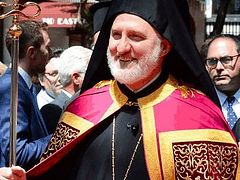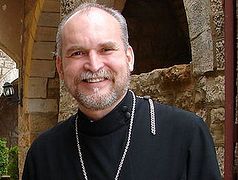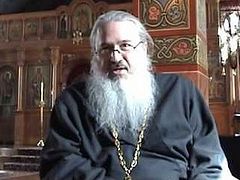Like Montag, I was to be rid of all my books.
I was to unlearn all that I have read and believed.
I was expected to ignore centuries of tradition and Holy Tradition.
Ultimately, I was expected to ignore the apostolic lineage of truth.
I was to become ignorant and a pawn.
The Bible and letters and texts by the Apostolic and Church Fathers were to be burned.
“A book is a loaded gun.”1
I was expected to yield without question,
“Stand at the top of a cliff and jump off and build [my] wings on the way down.”2
I am expected to put out the stars and extinguish the Son.
I refused.
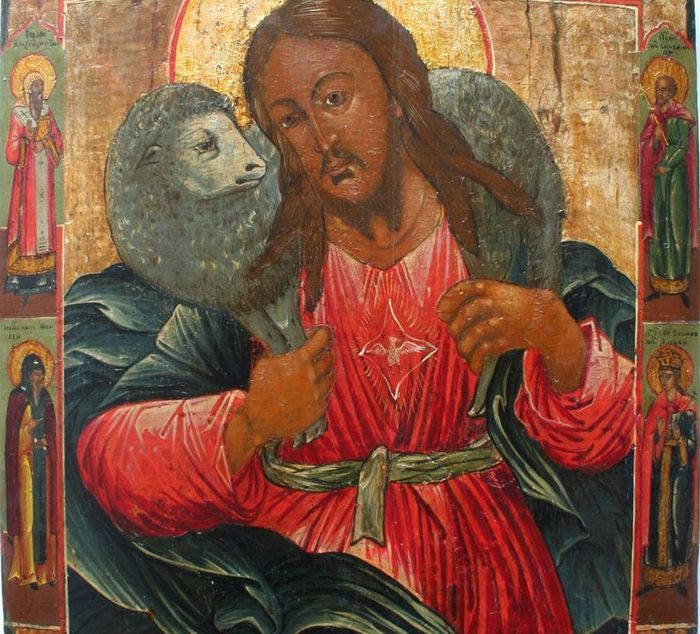 Good Shepherd. Photo: wikipedia
Good Shepherd. Photo: wikipedia
After military retirement in 1998, I wandered. I was taken in by a saintly man, Metropolitan Nicholas of Amissos. His message was simple, “Follow me.”3 I followed, not knowing where I was destined. Slowly, I was nurtured. Deliberately, I was fed. His Eminence’s time with his students was his greatest gift.
I spent the next three-and-one-half years in study—classroom and autodidactic—and travel with His Eminence while in the Diaconate program. I recall asking why he was educating deacons; his answer was direct and straightforward. “You know, our people are getting old, and some of our parishes are very small. And I am going to take care of our people until the last. I will not abandon them. They have sacrificed a lot coming to America.” His love and devotion to his people were unbounded.
The American Carpatho-Russian Orthodox Diocesan (ACROD) Diaconate program was not without controversy. Behind the scenes, numerous senior clergy were non-supportive; this I experienced first-hand.
Some of the deacons, of which I was one, were ordained to the priesthood. Each one of us has a different story, and His Eminence had differing reasons for our ordination.
The beauty—a divine beauty—of His Eminence was his openness and accessibility. I and others made numerous visits unassociated with scheduled weekend classes to have breakfast or lunch with him. He was always welcoming and pleased to see us. Because he was always teaching, by word and deed, especially storytelling, every meeting was a learning opportunity.
I recall one day, long before my ordination, having journeyed to meet His Eminence for breakfast, that he was annoyed. I, in complete ignorance, asked the source of his ire to which he replied, “It’s that Pretender Patriarch in Kyiv, he’s making trouble again.” Little did I know then that then-would-be-today.
In 2011 His Eminence fell asleep in Lord. Since then, nothing has been the same.
Under new leadership in 2012, the first meeting with the new hierarch was, without question, confrontational—him to the clergy. He announced the end of the Diaconate program, “If men don’t want to spend full-time at the seminary, they should receive no ordination of any type.” And he stated that all of us who had been ordained to the priesthood via the diaconate program “were impostor priests.”4
What happened within the diocese became of more significant concern, it went from a population of over 10,000 before 2000 to just over 4,000 by 2018.
Without deacons, more than one parish was abandoned by the hierarchy. And if a legally state incorporated church, such as the one in North Royalton, Ohio, was without a deacon and it desired to perpetuate its existence by selling a part of its property, the hierarch filed a lawsuit claiming rights to its proceeds. The dues of the diocesan parishes are funding the present trial; in other words, the hierarchy is pitting every ACROD diocesan parish against Christ the Saviour in North Royalton. (It is very much akin to the Metropolitan Emmanuel of Gaul’s legal threats to Archbishop John in Europe.5)
Although I was not present, when the hierarch was asked about the diaconate program at the 2019 clergy convocation, he responded strongly and negatively. There would be no more deacons and no support to parishes that could no longer economically support a priest with a full-salary, health, housing, and retirement benefits. His implicit message was two-fold: he was going to allow the diocese to demographically and spiritually implode, and earthly treasure takes precedence over eternal souls.
That the sun is setting on the diocese and its people is evident to those who choose to see.
And, as an embedded footnote, if you don’t know, he’ll inform you, the hierarch was selected to attend the 2106 Holy and Great Council of the Orthodox Church. After the Council, we priests, at the subsequent diocesan clergy conference, heard of the guffaws and hilarity of the attendees, not the reverence and the decisions made.
I must admit that I was not sufficiently attentive to the Council’s motives and potential consequences—until October 15th, 2018, when a priest colleague, Archpriest Mark Tyson, was accepted into the Russian Orthodox Church Abroad. To say my eyes were opened is an understatement. The Gospel of Mark (18:8) was meant for me, Having eyes do you not see, and having ears do you not hear?
After October 15th I spoke to other (non-ACROD) hierarchs and priests, Church historians (PhDs), and Orthodox Christian canon law lawyers. I researched. I read. I prayed. The higher my probing, questioning, and seeking of the truth, the more physically ill I became. Sleep faded. Tension rose. My body erupted with shingles across my head – top, forehead, and surrounding my right eye. The literal matched the spiritual pain.
The question for me became: was I willing to sacrifice my integrity to men who were ignoring the apostolic priesthood—men telling me by their deeds that the apostolic priesthood was of no consequence?
That all my colleagues in the Ecumenical Patriarchate and I were being used was evident. One only needed to look at a photo or read an article and note that the US Secretary of State, a US Ambassador or the latter’s representative, or a member of the Greek government was in proximity—time and space.
During the Fall of 2018, my former hierarch had never communicated anything to his clergy. Silence is not leadership.
I concluded the following, albeit the following words are of better articulation.
The authority of the Scriptures [and] tradition laid down over the centuries to which [Orthodox Christian hierarchs] supposedly pledged their fidelity, is the sole source of their authority... Bishops are not supposed to make things up as they go along, however smart and sensitive they imagine themselves to be. They serve a higher power.6
I, too, serve a higher authority.
Given the diocesan’s leadership silence, combined with the uninhibited and complete excoriation—the hiding of knives in words—of Fr. Mark Tyson, meant those who remained were expected to ignore centuries of tradition and Holy Tradition lest they suffer the same pain and humiliation. Ultimately, I was supposed to ignore the apostolic lineage of truth. I was expected to become ignorant and a pawn. The Bible and words of the Apostolic and Church Fathers were to be burned. I was supposed to yield without question. I could not.
Local dialogue was futile, given the unilateral acts originated in Constantinople. And the treatment of Fr. Mark was uncivil, highly secular, and wholly un-Christian. Furthermore, the local intra-diocesan dialogue was further impossible given the character of the hierarch, his spiritual pliancy to the times, and the traps laid within the diocese. I knew I had no one to turn to within the diocese—no one whom I could trust. Fear reigned then and reigns/rains within the diocese to this day. A climate of fear is not leadership. Fear is not equal to respect.
As a retired military officer, I have been well trained not to obey illegal orders, explicit and implicit. And I have done such—not obeyed illegal orders—in peacetime and combat. And now I would have to act again.
I would not abandon my apostolic priesthood, God’s priesthood. I would not be accountable to God for leading my parishioners into an earthly purgatory and eternal hell. That is not what a military officer does to his troops. It is not what an apostolic priest does to his parishioners, knowing he is engaging in a cosmic war.7
Rhetorically reading, I came across the following quote.
“Where, gentlemen, did you get the idea that these churches “belong” to you? Probably the same place you got the idea that the Church “belongs” to you. This may come as a shock, but they don’t, and it doesn’t.”8
I long ago learned that “there are two ways to be fooled: one is to believe what isn’t true and the other is to refuse to believe what is true.”9 I refused then, and I refuse today to be a part of the foolery.
By way of analogy, the excellent marketing trick of political Progressives and progressive Orthodox Christians is pretending—often starting with themselves—that they have unimpeachable authority on their side. The last pretense holds that some expert in the Hellenic Orthodox Christian worldview is smarter than the whole of the non-Hellenic Orthodox Christian world. Both political Progressives and progressive Orthodox Christians sell this idea by drowning opponents and anyone listening with jargon aided today by international politics and intrigue. Moreover, the capacity for the so-called experts to delude themselves into thinking their agenda isn’t shot through with political or ideological biases is profound. They will do anything to destroy the historical status quo under the guise of enlightenment.
In other words, they start with the object of their desire and reason backward from it engaging in ex post facto reasoning, the very basis of Gnosticism and Protestantism. Being led toward a Protestant form of Orthodox Christianity is wholly contrary to the nature of truth—a priori apostolicity.
 Fr. Nectarios Trevino. Photo: nativityorthodox.com I was accepted into the Russian Church Abroad on November 30, 2018.
Fr. Nectarios Trevino. Photo: nativityorthodox.com I was accepted into the Russian Church Abroad on November 30, 2018.
I, too, was subsequently excoriated. Truth and tradition were irrelevant—my former hierarch would address neither when he finally visited my former parish to comfort them three months later. He, knowing of my military background, did state that I should be shot for abandoning my post—a superb example of Orthodox Christian leadership wholly imbued with the secular violence of the day: destroy the person, avoid the content, facts, and truth.
As for many of my former parishioners, I was to learn they were nationalistic, attached to the facility, rabidly anti-Russian, or emotional. My former hierarch had his rabble—a Pyrrhic victory.
I was troubled by the malicious and deeply wounding knives from the former hierarch. I gained a whole new appreciation and understanding of the words “Simon, Simon, behold, Satan demanded to have you, that he might sift you like wheat” (Luke 22:31).
I found solace in many places, one of them being the following.10
Time and time again, we hear the Stoics tell us to say what is right, to do what is right, to be comfortable swimming upstream or rejecting the choices of the mob. Marcus Aurelius said this.11 Seneca said it.12 Cato said it.13 Nassim Taleb says it still today.14
What usually goes unsaid alongside these inspiring calls—whether it’s, “If you see fraud, say fraud,” or, “If it’s not right do not do it, if it’s not true do not say it”—is anything about the consequences. Because while history admires whistleblowers and men and women of principles, their contemporaries often have the opposite reaction. Because speaking the truth and standing up for what’s right is an implicit rebuke of the status quo. It challenges people’s identities. It indicts them for not doing the same. (Emphasis added.)
This is important to know and to constantly remind oneself of. It’s almost like you need to do a premeditatio malorum15 for what happens when you commit to being a good and honest and courageous person. Because it’s not going to be easy. People are not going to throw you a parade. They’re much more likely to throw brickbats. Or insults.
But you have to do what you think is right, and, as Marcus Aurelius said, treat the rest like it doesn’t matter.16 Who cares if they unsubscribe from your emails? Who cares if they report you? Or leave nasty comments? Or try to bully you?
Because the truth is that none of these things matter. Or at least, they don’t matter more than your duty.
Yes, the author is quoting Stoics. I can tell you that “treating the rest like it doesn’t matter” is more than an intellectual challenge. While the preceding is inherently logical, I needed strength beyond the intellect.
One year has passed since my merciful acceptance into the Russian Orthodox Church Abroad. And I have many to whom I owe thanks.
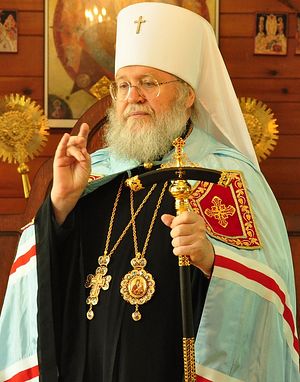 My greatest source of spiritual comfort and strength came from His Eminence Metropolitan Hilarion, First-Hierarch of the Russian Church Abroad. He provided me with safe harbor during the storm—I have prayed for you that your faith may not fail; and when you have turned again, strengthen your brethren (Luke 22:32). Because of His Eminence’s courage and love, I am still within God’s apostolic priesthood. To His Eminence, I will be forever indebted.
My greatest source of spiritual comfort and strength came from His Eminence Metropolitan Hilarion, First-Hierarch of the Russian Church Abroad. He provided me with safe harbor during the storm—I have prayed for you that your faith may not fail; and when you have turned again, strengthen your brethren (Luke 22:32). Because of His Eminence’s courage and love, I am still within God’s apostolic priesthood. To His Eminence, I will be forever indebted.
Spiritual strength came from afar, from a hierarch whom I’ve never met, but his example will forever be in my heart—His Beatitude Metropolitan Onuphry of Kyiv and All Ukraine. He embodies the Beatitudes (Matthew 5:3–12 RSV). There is no guile in him.
Surprisingly a source of comfort came from other holy hierarchs in the Holy Orthodox Church; the hierarchs are not within the Church Abroad.
I also received emails from prominent American Orthodox Christian priests as well as local priests.
And the priests from the Russian Orthodox Church Abroad truly labor in Christ’s vineyard, and as we said in the military—they do not wear their rank on their shoulders (or chest), but within their hearts in humility.
Lastly, grace was evident during the Holy Mystery of Repentance when the priest told me to man up17 - my words. After pouring out my heart in confession, there was a pause, and the priest said, “So, what's the matter? Can’t you live up to the name saint's name your ordaining bishop gave you?”

